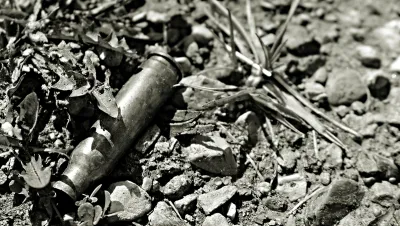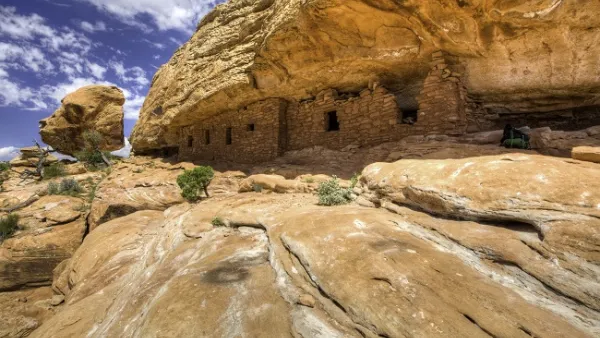A dramatic entrance on horseback preceded one of Ryan Zinke's first actions as Secretary of the Department of Interior—rescinding guidance issued by the Fish & Wildlife Service to phase out the use of toxic, lead ammunition on federal lands.

For the equestrians who follow Planetizen, as reported by Juliet Eilperin for The Washington Post:
Zinke — who was confirmed by the Senate on Wednesday [March 1] by a 68-to-31 vote — rode with a nine-person mounted police escort to the Interior Department’s downtown headquarters on Tonto, an Irish sport horse [on Thursday]. The horse, a bay roan gelding standing just over 17 hands tall, is normally kept in stables on the Mall and is owned by the U.S. Park Police.
After settling into his new office, the former Republican congressman from Montana signed two orders which his department's media office lumped, some might say questionably, as "Orders to Expand Access to Public Lands."
Perhaps the rationale for calling Secretarial Order No. 3346 (pdf), the order which rescinds the Jan. 20, 2017 lead ammunition ban on federal lands, as "expanding access" is that "[s]everal gun rights and hunting groups had objected to the policy...on the grounds that non-toxic copper and steel shot is somewhat more expensive," reports Eilperin.
Stephen Gutowski of the Washington Free Beacon quoted now-former U.S. Fish and Wildlife Service Director Dan Ashe, an Obama appointee, to explain the rationale behind the the Jan. 20 ban, President Obama's last day in office:
"Exposure to lead ammunition and fishing tackle has resulted in harmful effects to fish and wildlife species," Ashe said in his order [no longer on the agency's website]. "According to the U.S. Geological Survey, lead poisoning is a toxicosis caused by the absorption of hazardous levels of lead in body tissues."
"Ingested lead pellets from shotgun shells have been a common source of lead poisoning in birds," the order continued. "The Service recognized the problem of avian exposure to lead shot used for waterfowl hunting and enacted restrictions in 1991 and hunting and waterfowl populations have thrived since."
Eilperin reports that advocates of the lead ban claim that is lead poisoning from ammunition is "estimated to kill between 10 and 20 million birds each year, along with other species."
While the older restrictions that pertain to waterfowl hunting will presumably remain, it's the expansion enacted on Jan. 20 that was rescinded on March 2 by the first of the two orders that Secretary Zinke signed. The second order, Secretarial Order No. 3347 (pdf), does, in fact, expand access "by directing bureaus and agencies to immediately identify areas where recreation and fishing can be expanded," according to the press release.
Eilperin also reports on an issue covered recently in Planetizen: the transfer of federal lands to states and municipalities.
Zinke made it clear in his note that he was adamantly opposed to selling off federal lands, as some congressional Republicans had proposed, but he wanted to give Interior employees more flexibility in how they operate.
One final note on President Trump's cabinet: Former Governor of Texas, Rick Perry, was confirmed Thursday, March 2, as Secretary of the Department of Energy on a 62 to 37 vote. Perry, a twice-presidential candidate in the Republican primary, had stated during a 2011 debate that the DOE was one of there federal agencies he wanted to eliminate, though he infamously forgot its name.
FULL STORY: The new interior secretary just rode into work on a horse

National Parks Layoffs Will Cause Communities to Lose Billions
Thousands of essential park workers were laid off this week, just before the busy spring break season.

Retro-silient?: America’s First “Eco-burb,” The Woodlands Turns 50
A master-planned community north of Houston offers lessons on green infrastructure and resilient design, but falls short of its founder’s lofty affordability and walkability goals.

Delivering for America Plan Will Downgrade Mail Service in at Least 49.5 Percent of Zip Codes
Republican and Democrat lawmakers criticize the plan for its disproportionate negative impact on rural communities.

Test News Post 1
This is a summary

Test News Headline 46
Test for the image on the front page.

Balancing Bombs and Butterflies: How the National Guard Protects a Rare Species
The National Guard at Fort Indiantown Gap uses GIS technology and land management strategies to balance military training with conservation efforts, ensuring the survival of the rare eastern regal fritillary butterfly.
Urban Design for Planners 1: Software Tools
This six-course series explores essential urban design concepts using open source software and equips planners with the tools they need to participate fully in the urban design process.
Planning for Universal Design
Learn the tools for implementing Universal Design in planning regulations.
EMC Planning Group, Inc.
Planetizen
Planetizen
Mpact (formerly Rail~Volution)
Great Falls Development Authority, Inc.
HUDs Office of Policy Development and Research
NYU Wagner Graduate School of Public Service





























